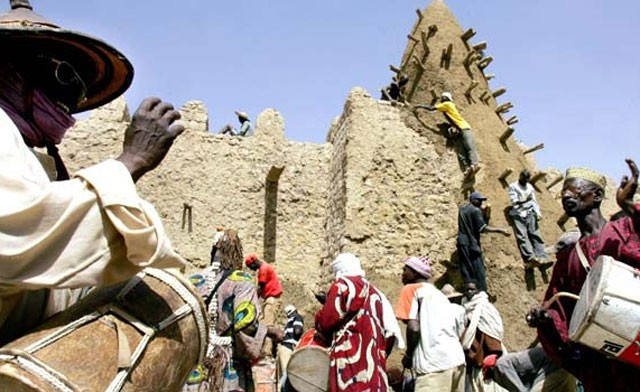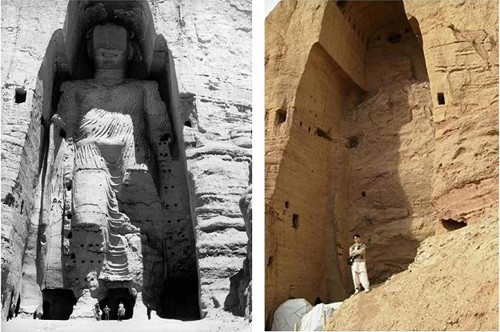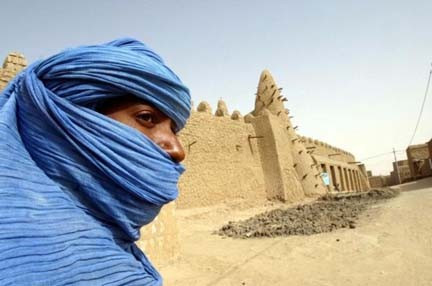Will Timbuktu become the New Bamiyan? Mali Ansar Dine Islamists Vow to Destroy All Sufi Shrines in Ancient City [VIDEO]
Islamist group says shrines are idolatrous and pledges to destroy all 16 holy Sufi sites in Timbuktu in name of religion
Ansar Dine, a group with links to Al-Qaida, has vowed to destroy every Muslim shrine in the ancient Malian city of Timbuktu "in the name of religion".
Members of the group, which forged links with Al-Qaida in the Islamic Maghreb, destroyed the tombs of Sidi Mahmoud, Sidi Moctar and Alpha Moya on 30 June. The following day, they attacked Cheikh el-Kebir's mausoleum in front of residents, along with another two sites.
Islamists regard shrines as idolatrous and the group has pledged to destroy the remaining 10 shrines in Timbuktu before imposing Sharia law.
"We will destroy every mausoleum in the city - all of them, without exception, before we apply Sharia in this city," Ansar Dine spokesman Sanda Ould Boumama said.
Another spokesman for the group, Oumar Ould Hamaha, told Reuters: "We are subject to religion and not to international opinion.

"Building on graves is contrary to Islam. We are destroying the mausoleums because it is ordained by our religion."
The destruction took place a few days after the Unesco's World Heritage committee placed the mausoleums of Muslim saints in Timbuktu on its list of endangered sites, following a request from the Malian government.
It is not the first time the destruction or loss of cultural heritage has occurred as a "collateral" effect of armed conflict.
The Ansar Dine move is reminiscent of the Taliban's destruction of two massive ancient Buddha statues which were carved in sandstone cliffs in the third and fifth century AD in Bamiyan, about 90 miles west of Kabul, Afghanistan.
In 2001, the Taliban blew up the unique momuments cliaming they were idols.

Residents' outcry

While Ansar Dine regards the shrines as idolatrous, the sites are revered by Sufi Muslims.
Moussa Maiga, who lives in Timbuktu, explained: "They say that the population loves the saints like God."
Residents angered by the destruction have said the historic city's Islamic roots precede the arrival of the Islamist sect.
"Timbuktu was an Islamic city since the 12th century and we know what the religion says about the saints' tombs," said Bouya Ould Sidi Mohamed, another resident.
"Contrary to what the Islamists or the Wahabis [branch] of Ansar Dine say, here in Timbuktu, the people don't love the saints like God, but just seek the saints' blessings because they are our spiritual guides," he added.
Stop the war crimes
The government in Mali condemned the destruction as being on par with "war crimes" and said it would be referring the case to the International Criminal Court (ICC) in The Hague.
Fatou Bensouda, who has recently been sworn in as chief prosecutor at the ICC, said: "My message to those involved in these criminal acts is clear: stop the destruction of the religious buildings now."
UN secretary general Ban Ki-moon said the attacks were "totally unjustified" and urged all sides involved in the conflict to enter negotiations to preserve the country's cultural heritage.
"The secretary general reiterates his support for the ongoing efforts of ECOWAS [Economic Community of West African States], the African Union and countries in the region to help the government and people of Mali resolve the current crisis through dialogue," his spokesperson said in a statement.
Ansar Dine controls much of northern Mali, following a coup in March in the capital Bamako, which overthrew president Amadou Amani Touré.
Tuareg rebels from the separatist movement National Movement for the Liberation of Azawad initially backed Ansar Dine, but the two groups have since split, leading to the ethnic Tuaregs being forced out of Timbuktu.
© Copyright IBTimes 2025. All rights reserved.





















